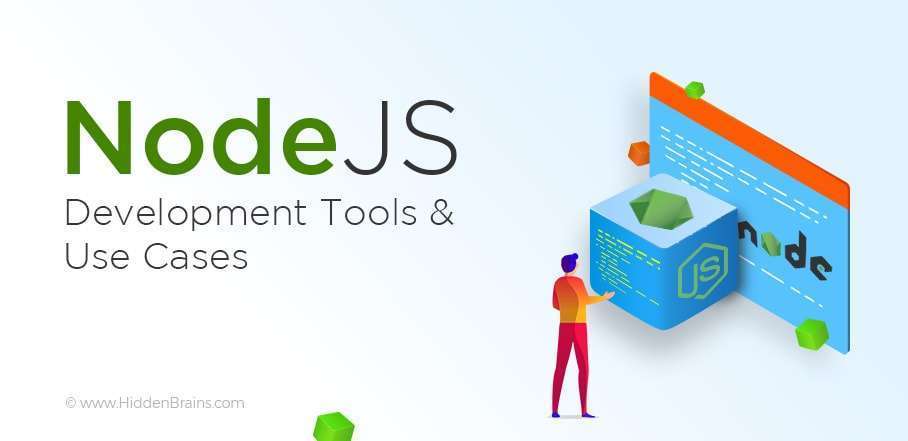Table of Contents
Originally written by Ryan Dahl in 2009, Node.js is an open-source, cross-platform JavaScript run-time environment that executes JavaScript code outside of a browser. Primarily used for client-side scripting, JavaScript, NodeJS Development Services & Solutions lets developers use JavaScript to write command line tools and for server-side scripting—running scripts server-side to produce dynamic web page content before the page is sent to the user’s web browser.
Node.js effectively represents a “JavaScript everywhere” paradigm, unifying web application development around a single programming language instead of different and often conflicting languages for server side and client side scripts.
Use Cases for Node.JS Development Services
Browser Games
Node.js in collaboration with Socket.io and HTML5 helps build some of the most immersive and engaging browser-based games using real-time web application technology.
Chat Rooms
It is an era of staying social and most people use social media platforms to chat. Creating chat rooms with NodeJS is a task that can be accomplished using Node.JS. Independent chat rooms might not have much popularity on today’s Internet, but online games are more fun when there is a chat component to them.
Collecting Data
NodeJS can collect massive amount of data, making the entire process more efficient. Collecting large quantities of data can often cause a bottleneck, NodeJS can help effectively overcome this problem and receive this data. The data gets stored without any system breakdowns.
Streaming
Video and audio files uploaded to streaming video services can be processed to be viewed or heard by users all over the world. The processing of files occurs after they have been uploaded. With Node.js, videos can be processed saving time and making media accessible at a faster rate.
Top Node JS Development Tools
Minimal and flexible Node.js web application framework, ExpressJS provides a comprehensive set of features for web and mobile applications. With HTTP utility methods and middleware, it allows creating a robust API. Often dubbed as “de facto” standard server framework for Node.js, ExpressJS provides a thin layer of fundamental web application features, without obscuring Node.js features.
Working seamlessly on every platform, browser or device, Socket.IO allows real-time, bidirectional and event-based communication. One of the most powerful JavaScript frameworks on GitHub, the focus is on high-level reliability and speed. Whether it is large enterprise or dynamic startups, Socket.io is one of the most dependable npm modules.
BlueBird.js, a promise library for JavaScript and the standard library for a promise implementation in relatively new versions of browsers and node/io.js.
- Bluebird is compatible with different platforms, making it come across as an ideal choice for providing consistency across cross-platform.
- It can work as a drop-in replacement for native promises for an instant performance boost.
- Based on Pragmatic route instead of a theoretically elegant one when there is a conflict. The library’s API was created based on real-life use cases.
- Bluebird provides tools and utilities for a highly expressive and fluent DSL for asynchronous JavaScript.
- Bluebird’s server-side performance is measured with highly relevant macro benchmarks coming out on top.
- Drop-in replacement for native promises resulting in performance boost.
New web framework designed by the team behind Express, Koa provides a foundation for web application and APIs. With its async functions, Koa lets you to ditch callbacks and greatly increase error-handling. It provides an elegant suite of methods that makes writing servers fast and enjoyable. This improves interoperability, robustness, and makes writing middleware much more enjoyable.
A Koa application is an object containing an array of middleware functions which are composed and executed in a stack-like manner upon request.
Hosted on GitHub, Mocha is a JavaScript test framework running on Node.js and in the browser. Mocha makes asynchronous testing quick, easy and hassle free. Mocha tests run serially, allowing for flexible and accurate reporting to map uncaught exceptions for accurate test cases.
Considered smartest editor, WebStorm is a full power modern JavaScript with intelligent code completion, navigation and refactoring for JavaScript
- Debug your client-side and Node.js apps with ease in the IDE.
- Run and debug tests with Karma, Mocha, Protractor, and Jest in WebStorm.
- Unified UI to work with Git, GitHub, Mercurial, and other VCS
- With different code styles, plugins, and themes, WebStorm allows to transform the look and behaviour of the IDE.
- Autocompletion feature that suggests which variables and methods are relevant in the current context.
- Built-in developer tools and out-of-the-box language and framework support.
- Easily navigate file for at-a-glance view of its structure.
Jest is a JavaScript Testing Framework fully committed to ensure complete correctness of JavaScript codebase.
- It requires little configuration and extensible to meet your requirements.
- Jest runs test in a reliable way, as well as reorganize run on the basis of length of test files
- Collect code coverage information from entire projects, including untested files.
An authentication middleware for Node.js, Passport.JS provides a choice of more than 300 different methods of authenticating user app via username and password model, login via Facebook, Google, Twitter and much more.
One developer tool that stands for its simplicity and ease of use is PM2. It actually serves as a process manager, especially for Node.js applications and comes with different features considered ideal for a production environment. PM2 also gets support for the community of developers and enterprises from all over the world. PM2 empowers process management workflow, as well as refined behavior, options, environment variables, logs files of application via a process file.
- It’s particularly useful for micro-service based applications.
- Monitor both resource usage of applications, as well as monitor memory and CPU from terminal.
- Scalability of networked Node.js applications across CPU without code changes with cluster mode.
- New restart mode on PM2 Runtime to ensure your application restarts in an efficient manner.
- Real-time monitoring of in-code values by plugging custom metrics.
- Directly embed a process manager in your code.
Simplifying the process of application development and deployment, Webpack is widely used along with Node.js due to its capability to bundle and serve assets faster than other development tools. It is also used to bundle the JavaScript pages to get further implemented in a browser. As a result of this, the overall initial loading time is minimized.
Built on Express and MongoDB, KeystoneJS is an open source framework specializing to develop database-driven websites, applications and APIs in Node.js. Based on Express, Keystone is an open source and full stack framework. Keystone comes across as a feasible option to create database-driven websites, apps, and APIs in Node.js. Its auto-generated user interface makes it very easy to use and handle website.
- Express.js and MongoDB
- Dynamic Routes
- Database Fields
- Auto-generated Admin UI
- Simpler Code
- Form Processing
- Session Management
- Email Sending
Chai is a BDD / TDD assertion library for node and the browser allowing combination with any javascript testing framework. With several interfaces, chain-capable BDD styles provide an expressive language & readable style, while the TDD assert style provides a more classical feel.
Developers can build their own plugins to share with community or use the plugin pattern to DRY up existing tests.
Sinon.js is a standalone testing framework for JavaScript. The great thing about Sinon.js is the fact that it works with any given testing framework, as well as supports stubs, spies and mocks. It also supports most browsers (cross-browser support) and runs on the server using Node.js.
Created by WalmartLab, Electrode.js is extremely popular and widely used for React.js and Node.js applications. With a set of best practices and modern technologies, this tool ensures the reusability of the components, deployment of the applications to the cloud, as well as high performance.
Conclusion
Node.js lets developers build fast and scalable web solutions using lightweight code and highly suited to develop applications that require real-time interaction or collaboration. It is a powerful framework to infuse life to web application and develop end-to-end apps in JavaScript.










































